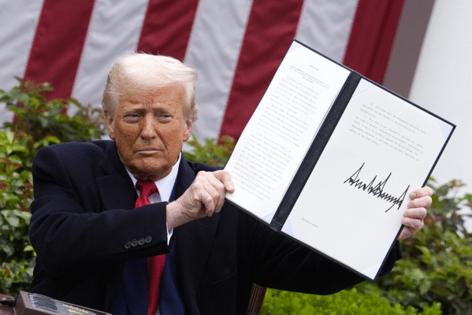Economists question the goals, approach of US tariffs
Published in Political News
President Donald Trump has said his tariffs on countries around the world will bring “jobs and factories roaring back” to the U.S.
Keith Maskus, professor of economics emeritus at the University of Colorado-Boulder, is among the economists and business representatives who don’t think that will happen. The sweeping tariffs have been slapped on allies and adversaries alike.
The U.S. Chamber of Commerce asked the Trump administration for exemptions to help small businesses that import goods and to “stave off a recession.”
“The idea that seems to underlie Trump’s basic objective here in bringing back manufacturing really goes back to the 19th century when a particular product could be produced in one location from beginning to end,” said Maskus, who was the chief economist at the U.S. State Department in the Obama administration and a lead economist at the World Bank.
“It’s not the 19th century any more. Supply chains make it almost imperative for manufacturing firms to have access to global markets,” Maskus added. “If you try to close yourself off in this way, with these very high tariffs, I think it will probably generate some additional investment in the U.S. by U.S. and foreign firms in certain sectors.”
But the gains won’t be great, Maskus said, because producing behind barriers without access to global technology and resources needed for manufacturing will be costly. If the goal is to use tariffs to isolate China, he said it would be wiser to collaborate with the other major Western economies.
Jack Buffington, a professor and director for the supply chain management program at the University of Denver, said he hopes the tariffs targeting most countries are simply attempts to negotiate trade deals. However, he said what should be pursued is “taking on China relative to how its supply chains work.”
The U.S. accounted for 50% of the world’s manufacturing after World War II and began investing in other countries to increase their manufacturing capacity and create a global trading model, Buffington said.
“China is not interested in that. China is only interested in being producers and not in being consumers,” Buffington said. “It’s good and right for us to stand up to that.”
The president slammed China with tariffs of at least 145%, sparking great angst among the many American businesses that import products or components from the country. Beijing indicated Friday that it is reviewing U.S. moves to open trade talks.
Maskus disagrees with the Trump administration’s declarations that other countries have been “ripping off” the U.S. with their trade policies based on the nation’s trade deficits. He said the argument ignores that the U.S. has “a great comparative advantage” in the trade of services.
“If you include services, the number of countries with which we have a deficit goes way down,” Maskus said.
Americans willingly import a high volume of high-quality goods and resources, Maskus added. “Those goods and materials directly raise U.S. living standards and productivity.”
Weighted for the total trade a country has in each commodity sector, the average tariff rates for rich and most middle-income nations “are essentially as open as the U.S. is,” Maskus said.
U.S. manufacturing’s highs, lows
Maskus also disputed the notion that U.S. manufacturing is in a slump. “It has lost a lot of manufacturing employment over the years, but the value of manufacturing output in the U.S. is almost historically high.”
In 2024, Maskus said the nation’s manufacturing output was valued at $2.94 trillion, just under 10% of the country’s gross domestic product. Adjusted for inflation, the real value of manufacturing was 40% higher than in 1990.
Manufacturing productivity has risen tremendously in the U.S, Maskus said, while shifting from more blue-collar jobs to high-skill, design and innovation intensive manufacturing sectors. “Those carry higher values and exports have been pretty high in those sectors.”
However, another trend in U.S. manufacturing has been sinking employment. The number of workers peaked in the 1990s at roughly 22 million workers and dropped to around 11 million workers between 2000 and 2010.
Since then, employment in manufacturing has rebounded slightly to about 12.5 million to 13 million, Maskus said. Manufacturing began evolving as far back as the 1950s and ’60s when companies moved textile and other factories from the northeast and the north-central regions to the southeast and south-central parts of the country
Tariff-free zones called maquiladoras in Mexico along the border added to the migration of jobs. Automation, companies with labor-intensive production moving to areas with lower wages and the North American Free Trade Agreement, NAFTA, further fueled changes.
Mexico and Canada gradually implemented NAFTA while the U.S. “just kind of went cold turkey” on tariffs, Maskus said.
“We didn’t offset the change with domestic support policies for workers who were going to lose their jobs,” Maskus said. “This is the big failure of American trade policy in the last several decades: the complete inability to offer the kinds of retraining assistance, housing assistance, mobility assistance and local development programs that would have shifted employment in the disadvantaged areas into some of the higher-tech regions.”
©2025 MediaNews Group, Inc. Visit at denverpost.com. Distributed by Tribune Content Agency, LLC.




























































Comments